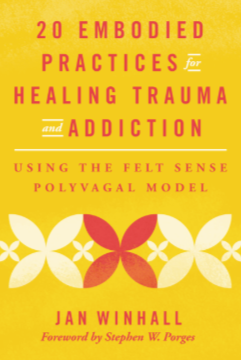🌟 New Year Offer 🌟
Celebrate 2025 with 30% OFF on all products! Use code: NEWYEAR2025. Hurry, offer ends soon!
A transformative approach that places the wisdom of the body at the center of trauma healing and addiction recovery.
File Size: 397.53 MB. Format File: 1 M4B…
Jan Winhall – 20 Embodied Practices for Healing Trauma and Addiction

Trauma and addiction often move hand in hand, creating cycles of suffering that traditional approaches sometimes struggle to break. But what if these challenges weren’t simply “disorders” or “diseases” — what if they were adaptive responses, deeply rooted in the body’s natural attempt to regulate overwhelming experiences? The Felt Sense Polyvagal Model: Healing Trauma and Addiction by Jan Winhall invites readers and listeners to see trauma through a groundbreaking new lens.
At the heart of this work lies a radical yet compassionate reframing: instead of viewing addiction, dissociation, and other trauma-related struggles as pathology, Winhall presents them as survival strategies. They are ways the autonomic nervous system (ANS) attempts to cope, regulate, and restore balance in the face of pain. By understanding these responses, we can move away from self-blame and shame, and toward healing, acceptance, and lasting transformation.
Drawing upon the pioneering neuroscience of Dr. Stephen Porges’s Polyvagal Theory and Eugene Gendlin’s concept of the felt sense, Jan Winhall weaves together a deeply somatic model of recovery. This integration forms what she calls the Felt Sense Polyvagal Model (FSPM) — a transformative approach that places the wisdom of the body at the center of trauma healing and addiction recovery.
Through this model, readers gain two powerful tools:
Learning to recognize and rewire autonomic states — By understanding how the nervous system shifts between states of safety, mobilization, and shutdown, individuals can develop awareness of their own patterns and discover pathways to regulation.
Accessing the felt sense of somatic wisdom — Beyond intellectual understanding, this book invites readers to tune into their body’s subtle signals, sensations, and intuitive guidance. This embodied awareness unlocks profound healing potential that goes deeper than cognitive approaches alone.
The book offers 20 step-by-step practices that guide readers through exercises designed to gently re-pattern the nervous system. These practices are highly versatile and can be experienced individually, with a therapist, or alongside a trusted “felt sense partner.” Each exercise encourages safety, presence, and embodied exploration, helping to build resilience and restore inner harmony.
What makes Winhall’s approach especially unique is its accessibility. Whether you’re a clinician seeking tools for clients, a person navigating your own recovery, or someone simply curious about body-based healing, the model is presented in clear, grounded language that is easy to apply in daily life. Rather than overwhelming readers with abstract theory, Winhall emphasizes lived experience, compassion, and practical action.
Key highlights of The Felt Sense Polyvagal Model include:
A paradigm shift in how trauma and addiction are understood — moving from labels of “disorder” to recognizing adaptive responses.
Practical applications of Polyvagal Theory for everyday healing and recovery.
Twenty embodied practices designed to rewire the nervous system and support emotional resilience.
Guidance on working with a professional therapist or practicing with a “felt sense partner” for deeper integration.
An emphasis on compassion, body intelligence, and cultivating safety within.
By the end of this journey, readers come away with not just theoretical insights, but also real, actionable skills for building a healthier relationship with themselves and their bodies. The model empowers individuals to reconnect with inner wisdom, re-pattern automatic survival responses, and move toward wholeness.
For mental health professionals, this book provides a treasure trove of clinical applications that bridge cutting-edge neuroscience with embodied practice. For those on their own healing path, it offers an empowering, compassionate framework that validates lived experience while opening new possibilities for growth and transformation.
As an added resource, when purchased as an audiobook, listeners also receive access to a companion PDF with all exercises included — ensuring that the tools are available in both spoken and written form.
The Felt Sense Polyvagal Model is more than just a book; it’s an invitation to shift the way we see trauma, addiction, and healing. By trusting the body’s wisdom and embracing somatic intelligence, we unlock a path not just to recovery, but to profound self-connection and lasting resilience.
Course Features
- Lecture 0
- Quiz 0
- Duration 10 weeks
- Skill level All levels
- Language English
- Students 128
- Assessments Yes
